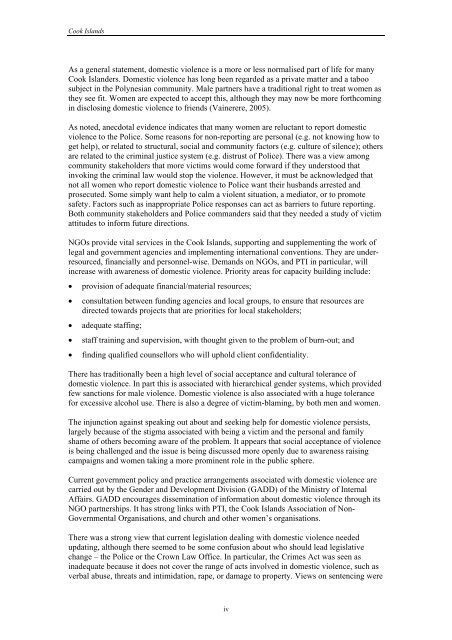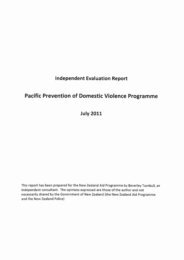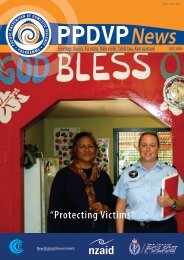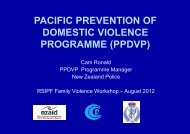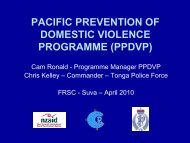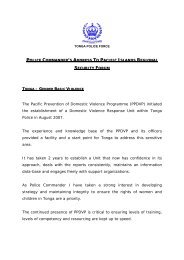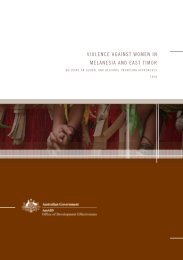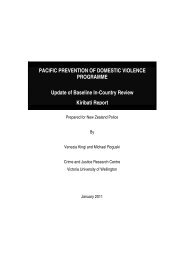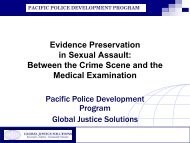Cook Islands - Pacific Prevention of Domestic Violence Programme
Cook Islands - Pacific Prevention of Domestic Violence Programme
Cook Islands - Pacific Prevention of Domestic Violence Programme
You also want an ePaper? Increase the reach of your titles
YUMPU automatically turns print PDFs into web optimized ePapers that Google loves.
<strong>Cook</strong> <strong>Islands</strong><br />
As a general statement, domestic violence is a more or less normalised part <strong>of</strong> life for many<br />
<strong>Cook</strong> Islanders. <strong>Domestic</strong> violence has long been regarded as a private matter and a taboo<br />
subject in the Polynesian community. Male partners have a traditional right to treat women as<br />
they see fit. Women are expected to accept this, although they may now be more forthcoming<br />
in disclosing domestic violence to friends (Vainerere, 2005).<br />
As noted, anecdotal evidence indicates that many women are reluctant to report domestic<br />
violence to the Police. Some reasons for non-reporting are personal (e.g. not knowing how to<br />
get help), or related to structural, social and community factors (e.g. culture <strong>of</strong> silence); others<br />
are related to the criminal justice system (e.g. distrust <strong>of</strong> Police). There was a view among<br />
community stakeholders that more victims would come forward if they understood that<br />
invoking the criminal law would stop the violence. However, it must be acknowledged that<br />
not all women who report domestic violence to Police want their husbands arrested and<br />
prosecuted. Some simply want help to calm a violent situation, a mediator, or to promote<br />
safety. Factors such as inappropriate Police responses can act as barriers to future reporting.<br />
Both community stakeholders and Police commanders said that they needed a study <strong>of</strong> victim<br />
attitudes to inform future directions.<br />
NGOs provide vital services in the <strong>Cook</strong> <strong>Islands</strong>, supporting and supplementing the work <strong>of</strong><br />
legal and government agencies and implementing international conventions. They are underresourced,<br />
financially and personnel-wise. Demands on NGOs, and PTI in particular, will<br />
increase with awareness <strong>of</strong> domestic violence. Priority areas for capacity building include:<br />
• provision <strong>of</strong> adequate financial/material resources;<br />
• consultation between funding agencies and local groups, to ensure that resources are<br />
directed towards projects that are priorities for local stakeholders;<br />
• adequate staffing;<br />
• staff training and supervision, with thought given to the problem <strong>of</strong> burn-out; and<br />
• finding qualified counsellors who will uphold client confidentiality.<br />
There has traditionally been a high level <strong>of</strong> social acceptance and cultural tolerance <strong>of</strong><br />
domestic violence. In part this is associated with hierarchical gender systems, which provided<br />
few sanctions for male violence. <strong>Domestic</strong> violence is also associated with a huge tolerance<br />
for excessive alcohol use. There is also a degree <strong>of</strong> victim-blaming, by both men and women.<br />
The injunction against speaking out about and seeking help for domestic violence persists,<br />
largely because <strong>of</strong> the stigma associated with being a victim and the personal and family<br />
shame <strong>of</strong> others becoming aware <strong>of</strong> the problem. It appears that social acceptance <strong>of</strong> violence<br />
is being challenged and the issue is being discussed more openly due to awareness raising<br />
campaigns and women taking a more prominent role in the public sphere.<br />
Current government policy and practice arrangements associated with domestic violence are<br />
carried out by the Gender and Development Division (GADD) <strong>of</strong> the Ministry <strong>of</strong> Internal<br />
Affairs. GADD encourages dissemination <strong>of</strong> information about domestic violence through its<br />
NGO partnerships. It has strong links with PTI, the <strong>Cook</strong> <strong>Islands</strong> Association <strong>of</strong> Non-<br />
Governmental Organisations, and church and other women’s organisations.<br />
There was a strong view that current legislation dealing with domestic violence needed<br />
updating, although there seemed to be some confusion about who should lead legislative<br />
change – the Police or the Crown Law Office. In particular, the Crimes Act was seen as<br />
inadequate because it does not cover the range <strong>of</strong> acts involved in domestic violence, such as<br />
verbal abuse, threats and intimidation, rape, or damage to property. Views on sentencing were<br />
iv


